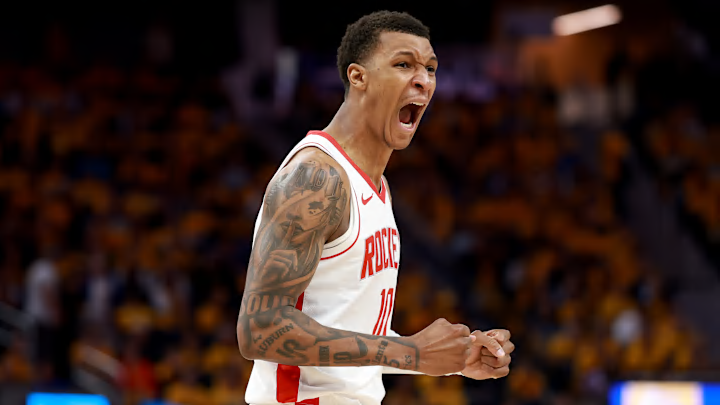Life comes at you fast. Not long ago, the Houston Rockets selected Jabari Smith Jr. with the third overall pick in the NBA draft. Soon, they'll have to think about his next contract.
When the Rockets selected Smith Jr., there was a euphoric feeling among some Rockets fans. For weeks, it had been rumored that the Magic had landed on Smith Jr. with the top selection. They opted for Paolo Banchero. The whole world knew the Thunder would take Holmgren, and Smith Jr. fell into the Rockets' lap.
Perhaps the Magic knew something. Banchero has looked like a viable primary option. He has struggles with efficiency, but he is an undeniably more dynamic offensive player than Smith Jr.
That's not to say that Smith Jr. has been disappointing. That would be an oversimplification. Yet, it would be naive to say he's met the standards of a typical third overall pick. His status in the NBA is complicated:
As will be his contract negotiations.
Rockets have much to consider with Smith Jr.
It's worth looking at who Smith Jr. is supposed to be in theory, who he's been in practice, and how far that divide may be.
When he was drafted, Smith Jr. was perceived as a supercharged 3-and-D. The sell was that he'd be a knockdown shooter who's able to defend multiple positions at 6'11".
In practice, Smith Jr. is shooting a pedestrian 34.0% from three-point range. If you remove his dreadful 30.7% three-point shooting as a rookie, Smith Jr. is at 35.8%. That's a notable improvement, and a passable mark for a 4. It's still not the prolific shooting that was advertised on draft night.
Here's a more encouraging stat: Smith Jr. shot 50.0% between 10 and 16 feet in 2024-25. He has firmly established himself as a midrange maestro. Unfortunately, that shot only has so much utility on a team with poor three-point shooting. To earn his keep with the Rockets, Smith Jr. needs to improve as a three-point shooter.
Defensively, Smith Jr. has been solid, but he's not a game-altering force. His 0.1 Defensive Box Plus/Minus (DBPM) from 2024-25 likely undersells his value, but only slightly. Smith Jr. has developed into a solid weakside rim protector, but he's not necessarily an optimal defender against guards or even quicker wings.
Succinctly, Smith Jr. has been solid but unexceptional. How much do you pay a guy like that?
Rockets must get team-friendly deal with Smith Jr.
Potential is often baked into NBA deals. That's especially true with former lottery picks. If the Rockets extend Smith Jr., they'll likely pay him under the assumption that he'll improve.
They should only invest so much in that assumption. Smith Jr. seems like a hard-working kid. He is likely to get better. He is equally unlikely to develop into a superstar.
The Rockets won't reconfigure their offense to feature Smith Jr. in the mid-range area. Whether they continue developing this core or trade for a star, he's going to be a play finisher in this offense. So, they can't afford to pay him as a shot creator with so much young talent on the roster.
They have time to wait. Smith Jr. is eligible for an extension this summer, but the Rockets could delay negotiations into next summer. They'll have another full year's worth of data. For argument's sake, let's assume that Smith Jr. either stagnates or improves marginally.
If so, a deal in the neighborhood of $20 million per season should suit the Rockets. They could go as high as $25 million if Smith Jr.'s people play hardball. Anything north of that figure should be too rich for Houston. They'll have to consider letting Smith Jr. walk:
Even if it feels like he joined the team just yesterday.
